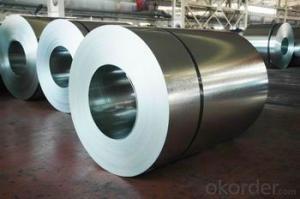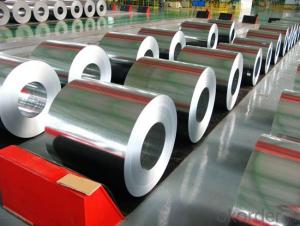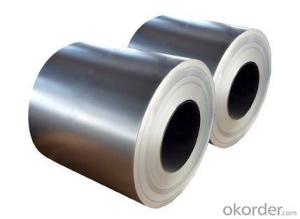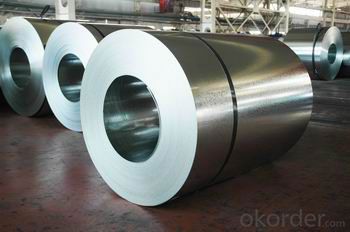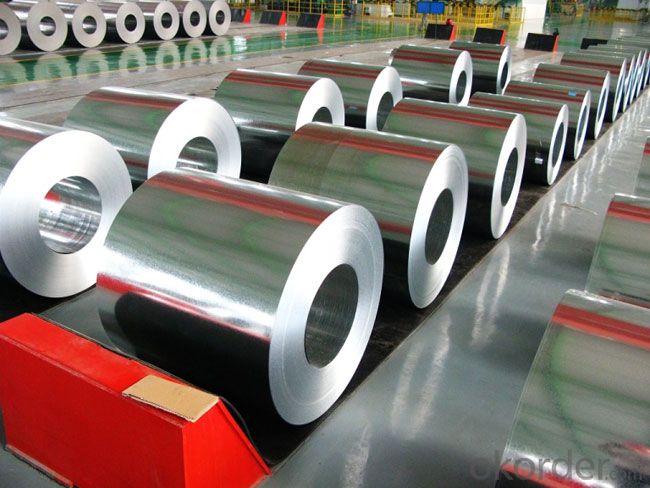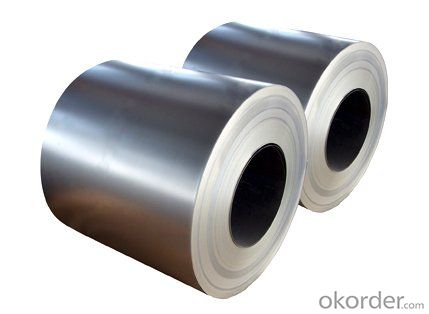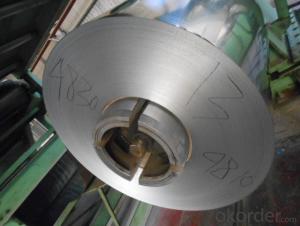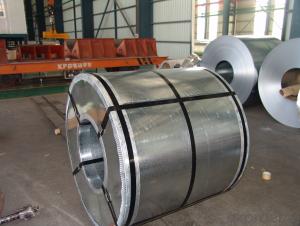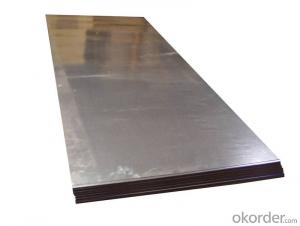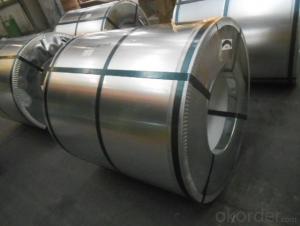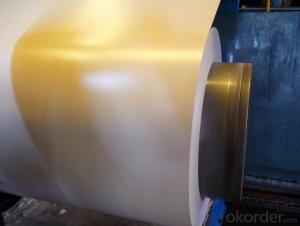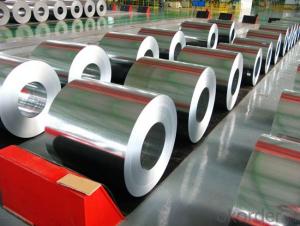Hot-Dip Galvanized Steel Coil with Prime Quality
- Loading Port:
- Shanghai
- Payment Terms:
- TT OR LC
- Min Order Qty:
- 200 m.t.
- Supply Capability:
- 10000 m.t./month
OKorder Service Pledge
OKorder Financial Service
You Might Also Like
1.Structure of Galvanized Steel Coil Description:
Hot-dip galvanized steel coils are available with a pure zinc coating through the hot-dip galvanizing process. It offers the economy, strength and formability of steel combined with the corrosion resistance of zinc. The hot-dip process is the process by which steel gets coated in layers of zinc to protect against rust. It is especially useful for countless outdoor and industrial applications.
2.Main Features of the Galvanized Steel Coil:
• Base material for countless outdoor and industrial applications
• High corrosion resistance
• High strength
• Good formability
• Rust- proof ability
• Good visual effect
3.Galvanized Steel Coil Images
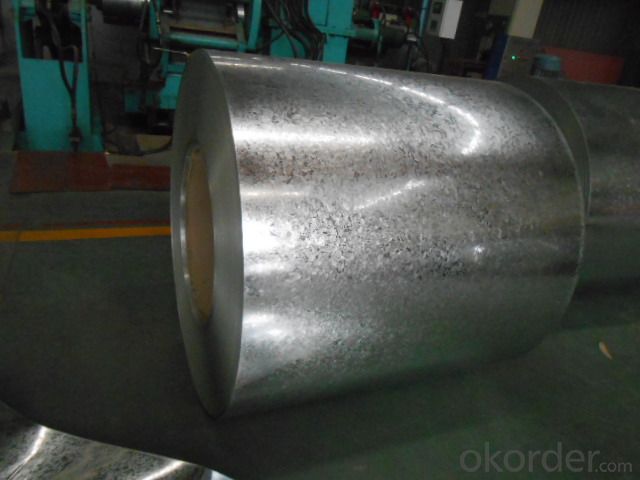
4.Galvanized Steel Coil Specification
Operate Standard: ASTM A653M-04/JIS G3302/DIN EN10143/GBT 2518-2008
Grade : SGCD,SGCH, Q195,DX51D
Zinc coating :40-180g( as required)
Width:914-1250mm(914mm, 1215mm,1250mm,1000mm the most common)
Coil id:508mm/610mm
Coil weight: 4-10 MT(as required)
Surface: regular/mini/zero spangle, chromated, skin pass, dry etc.
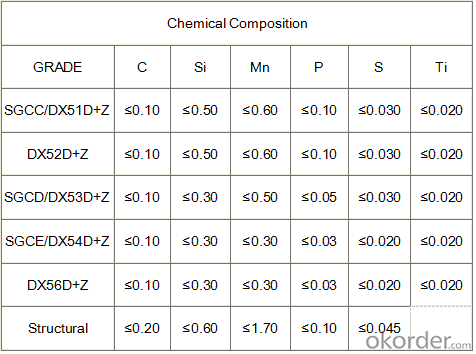
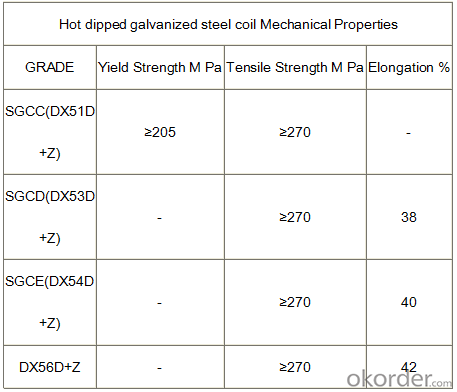
5.FAQ of Galvanized Steel Coil
We have organized several common questions for our clients,may help you sincerely:
1.How to guarantee the quality of the products?
We have established the international advanced quality management system,every link from raw material to final product we have strict quality test;We resolutely put an end to unqualified products flowing into the market. At the same time, we will provide necessary follow-up service assurance.
2. What is the minimum order quantity ?
Our MOQ is 50mt for each size. And we will consider to give more discount if you make big order like 1000 tons and more. Further more, the more appropriate payment term your offer the better price we can provide.
3.How long can we receive the product after purchase?
Usually within thirty working days after receiving buyer’s advance payment or LC. We will arrange the factory manufacturing as soon as possible. The cargo readiness usually takes 15-25 days, but the shipment will depend on the vessel situation.
- Q: What are the common quality control measures for steel coils?
- To ensure the performance and reliability of steel coils, several common quality control measures are implemented. These measures play a crucial role in upholding the overall quality of the coils and ensuring their compliance with the necessary standards and specifications. To begin with, dimensional checks are conducted to verify that the steel coils possess the correct thickness, width, and length. Deviations from the specified dimensions can significantly impact the coils' functionality and usability, making this check of utmost importance. Following that, visual inspections are carried out to identify any surface defects or imperfections such as scratches, dents, or corrosion. These inspections aid in identifying potential issues that could compromise the structural integrity of the coils or affect their aesthetic appearance. Moreover, mechanical property tests are performed to assess the strength, hardness, and other mechanical characteristics of the steel coils. These tests provide valuable insights into the coils' performance and durability under different conditions and loads. An essential quality control measure for steel coils is the analysis of their chemical composition. This involves scrutinizing the steel's composition, including the presence of any impurities or elements that may impact its properties. It ensures that the coils are made from the correct grade of steel and meet the required chemical specifications. Coating inspections also play a vital role in quality control. When steel coils are coated with protective layers, it is imperative to examine the adhesion, thickness, and uniformity of these coatings. This examination ensures that the coils have sufficient protection against corrosion and other environmental factors. Lastly, various non-destructive testing methods, such as ultrasonic testing, magnetic particle inspection, or eddy current testing, are employed to detect any internal defects or abnormalities in the steel coils. These tests enable the identification of issues like cracks, inclusions, or discontinuities that may not be visible through visual inspection alone. In conclusion, the quality control measures for steel coils consist of dimensional checks, visual inspections, mechanical property tests, chemical composition analysis, coating inspections, and non-destructive testing. These measures are vital in maintaining the quality and reliability of steel coils, guaranteeing their compliance with the required standards, and meeting customer expectations.
- Q: explain what happen if carbon steel is exposed to an oxygen rich atmosphere at elevated temperature inside a furnace.
- Assuming the steel isn't actually melted, two things will happen. First, a layer of iron(ii) oxide, FeO will slowly develop on the surface, getting thicker over time. This layer is usually poorly bonded to the metal surface, it tends to flake off, exposing fresh metal. This is known as mill scale, it's also known as wustite which is the mineral term. Second, the surface of the steel will become decarburized, essentially becoming pure iron, not steel. The depth of the decarburized layer depends on the temperature, time, and the diffusivity of carbon in the steel at the given temp. This has some implications to engineering, in hot-rolling or forging of steel shapes for example. It's often the case that the stress and strain in a material is greatest at or near the surface. Therefore the weakened, decarburized layer at the surface may have a much greater detrimental effect on the steel's performance than might be expected. In a more specific example, die and tool steels depend on their carbon content for their strength and wear resistance, Therefore if such steels are heated in an oxidzing atmosphere, wear resistance is totally destroyed: The thin decarburized iron layer will be extremely soft and malleable.
- Q: How are steel coils inspected for oil or rust residues using chemical analysis?
- Steel coils can be inspected for oil or rust residues using chemical analysis by first collecting samples from various parts of the coil. These samples are then analyzed using appropriate chemical techniques such as solvent extraction or acid digestion to extract any oil or rust residues present. The extracted substances can be further analyzed using methods like Fourier transform infrared spectroscopy (FTIR) or atomic absorption spectroscopy (AAS) to identify and quantify the specific contaminants. This chemical analysis allows for a thorough inspection of steel coils and helps ensure their quality and suitability for various applications.
- Q: and which one is better?i'm looking into buying some aftermarket headers, but companies make them in both chrome and stainless steel
- Chrome looks better, but it will eventually rust if it's exposed to enough moisture. Stainless steel will not rust. I would spend the extra money and get the stainless headers.
- Q: What are the common surface defects in steel coils?
- Steel coils commonly have surface defects, including scratches, pits, indentations, stains, and rust spots. Scratches may occur due to mishandling or processing, and their depth and length can vary. Pits are small depressions caused by impurities in the steel or during manufacturing. Indentations are similar but larger and more noticeable. Stains can result from chemicals, water, or other contaminants coming into contact with the steel. Rust spots form when the steel is exposed to moisture or corrosive elements, leading to iron oxide formation. These defects can impact the appearance, quality, and performance of the steel, necessitating their resolution to ensure the intended use of the coils.
- Q: I'm getting microdermals, from a very experienced piercer, but they don't have titanium and I know titanium is the best for this, but is Grade A Srugical Steel okay too?(P.S. also instead of getting flat heads, of the microdermals, I'm getting flat crystal like ones, are those okay? I know to be careful, I am veryyyy careful with my body, so much that I'm worried I'm going to overly do it when I get them and dry out the skin or something hahaa xp)THANK YOU ALL IN ADVANCE FOR THE HELP
- Well a lot of people get microdermals done with surgical steel,yes titanium if better but it can be done with surgical steel.If you want the titanium you can always ask the piercer where they get their jewelery and if they could order them for you.You could also go to a different shop and ask if they have titanium dermals you should be able to buy them off of them.If hes an expensive piercer and your paying a lot for them you should be able to get the ones YOU want.Its YOUR body not theirs. =] hope this helped.
- Q: What are the different types of steel coil handling attachments?
- Some of the different types of steel coil handling attachments include coil lifters, coil grabs, coil hooks, coil tongs, and coil C-hooks. These attachments are designed to safely lift, transport, and manipulate steel coils of various sizes and weights.
- Q: What are the different coil edge options?
- There are several different coil edge options available, including open coil, continuous coil, offset coil, and pocket coil. Each type of coil edge offers unique features and benefits. Open coil edges are interconnected and provide a durable and supportive foundation. Continuous coil edges are made from a single piece of wire and offer enhanced stability and motion isolation. Offset coil edges have an hourglass shape for improved contouring and pressure relief. Pocket coil edges consist of individual fabric-encased coils that move independently, offering personalized support and minimizing motion transfer. Ultimately, the choice of coil edge depends on personal preferences and desired sleeping experience.
- Q: I need to know the density of steel as one of my physical properties of steel. Any answers? If u have more physical or chemical properties of steel, that would help to thanks.
- The short answer to your question is that the density of plain mild steel is 7.85. The long answer is that depending on where you look, or the grade of steel that you are talking about can change this value. A density of 7.88 is often quoted for mild steel as well. If you add alloying elements such as tungsten, chrome or manganese to improve the steel, the density will change. So the long answer is that the density of steel can vary between 7.75 and 8.05.
- Q: What is the role of steel coils in the production of conveyors?
- Steel coils play a crucial role in the production of conveyors as they are used to create the framework or structure of the conveyor belts. The coils are formed into a continuous loop, which provides strength, durability, and flexibility to the conveyor belts. Additionally, the steel coils ensure smooth movement and support heavy loads, making them essential components in conveyor manufacturing.
Send your message to us
Hot-Dip Galvanized Steel Coil with Prime Quality
- Loading Port:
- Shanghai
- Payment Terms:
- TT OR LC
- Min Order Qty:
- 200 m.t.
- Supply Capability:
- 10000 m.t./month
OKorder Service Pledge
OKorder Financial Service
Similar products
Hot products
Hot Searches
Related keywords
